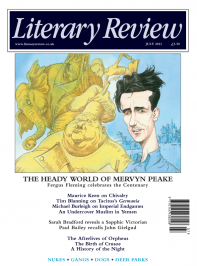Gillian Tindall
Kirkcaldy to Calcutta
The Inner Life of Empires: An Eighteenth-Century History
By Emma Rothschild
Princeton University Press 470pp £24.95
I want to like this book. Emma Rothschild has found a potentially wonderful subject, and the amount of digging she has done in different archives in Scotland, England, France and the United States, even as far as Hawaii, is impressive. Her starting point was earlier research she had done on Adam Smith for a book about the Enlightenment, and Smith is an intermittent but presiding figure in this one. Investigating a parliamentary election in Smith’s home town of Kirkcaldy, she came across a man named John Johnstone and, through him, unearthed the letter-book of one of his elder brothers, James. This trail led to eleven Johnstone siblings, born in Lowland Scotland in the 1720s and 1730s into a family of lawyers and factors with a ramshackle country seat but no money to support a landed lifestyle. Their energy and ambition were typical in that era of burgeoning trade and empire. The Johnstones made their way in Edinburgh, in London, in the East and West Indies, in the plantations of Virginia, in military and naval service, in speculation and in politics. Spouses, in-laws and long-standing family associates (sometimes the same people) swelled their numbers, as did children (legitimate or otherwise). It is the copious correspondence of this band, their reports to various company and state departments, their wills, annuities, bonds, mortgages and marriage settlements, their representations and protests to those in higher office, their own pronouncements in Parliament (three of them were eventually MPs), other people’s pronouncements on them, their subterfuges and alliances, and their epitaphs, that form the basis for this study of the times in which they lived.
It ought to be fascinating, and, incidentally, much of it is. William, the eldest of the brothers and a friend in youth of Adam Smith, sought his fortune on the far side of the Atlantic, where he eventually acquired a huge amount of property, married an heiress and

Sign Up to our newsletter
Receive free articles, highlights from the archive, news, details of prizes, and much more.@Lit_Review
Follow Literary Review on Twitter
Twitter Feed
Literary Review is seeking an editorial intern.
Though Jean-Michel Basquiat was a sensation in his lifetime, it was thirty years after his death that one of his pieces fetched a record price of $110.5 million.
Stephen Smith explores the artist's starry afterlife.
Stephen Smith - Paint Fast, Die Young
Stephen Smith: Paint Fast, Die Young - Jean-Michel Basquiat: The Making of an Icon by Doug Woodham
literaryreview.co.uk
15th-century news transmission was a slow business, reliant on horses and ships. As the centuries passed, though, mass newspapers and faster transport sped things up.
John Adamson examines how this evolution changed Europe.
John Adamson - Hold the Front Page
John Adamson: Hold the Front Page - The Great Exchange: Making the News in Early Modern Europe by Joad Raymond Wren
literaryreview.co.uk